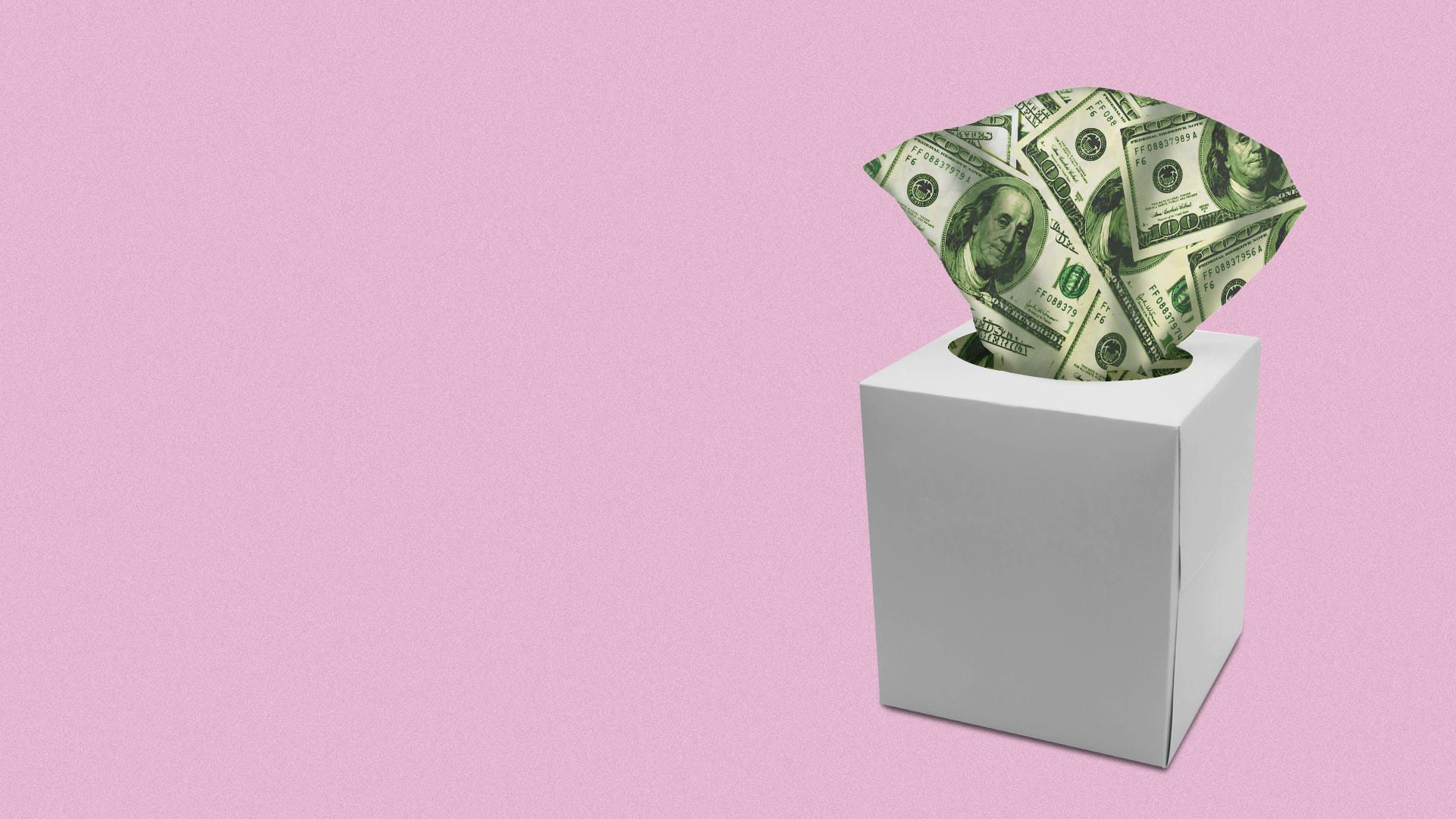The push for paid sick leave
Add Axios as your preferred source to
see more of our stories on Google.

Illustration: Eniola Odetunde/Axios
As cases of the novel coronavirus spread, millions of workers' lack of paid sick leave is becoming a serious concern for local officials and employers — and now an increasingly urgent agenda item in Washington, too.
Why it matters: Front-line workers who serve food, drive buses, care for children or the elderly and run cash registers are much less likely to be able to take time off if they are sick, increasing the risk of infecting others.
Driving the news: President Trump said Monday that he would pursue some form of relief for hourly workers, but left a meeting with congressional Republicans yesterday without any specific plan.
- A handful of companies, including Darden Restaurants, Uber, Lyft and Instacart, have begun offering some paid sick leave as the coronavirus outbreak has intensified.
Between the lines: Administration officials acknowledge the need to allow people who are sick or caring for someone who is sick to stay home from work without having to worry about losing income, a source with direct knowledge of their discussions tells Axios.
- But there’s a concern about creating the wrong incentives to ditch work: "We don't want to just basically shut down by giving everybody a blank check to not come to work, knowing that they're gonna get paid for it," the source said.
- There’s also a question of whether legislation is required to offer some version of paid sick leave, and what proposal details would best achieve the goal without providing workers with blanket unemployment insurance.
By the numbers: About 73% of all private-sector workers have paid sick leave from their employers, and about 88% of professional workers have paid sick leave, according to the Bureau of Labor Statistics.
- But the percentage of people with the benefit is much lower for those in sales (64%) and service jobs (58%), and those who work in construction and farming (56%).
- Just 25% of private-sector workers have at least 10 days of paid sick days a year, even after 20 years in a job, per BLS data cited by the Economic Policy Institute.
- That means even workers who can take time off may not have enough leave to weather a 14-day quarantine on top of days with symptoms, or caring for family members with them.
“From a patient- and human-centric response, know that there are millions of workers throughout this country who do not have the option of staying at home because if they do not go to work they will not get paid."— Jason Farley, professor at Johns Hopkins School of Nursing, at a briefing on Capitol Hill, March 6.
What they're saying: It's in employers' best interest to pay sick people who have to stay home, said George Roberts Jr., president of the National Association of County and City Health Officials, which oversees 3,000 U.S. health departments.
- "If they come to work and get other people sick, then the employer has more to deal with the next day and the day after," he said. "It's better off for the employer to offer that paid time than the alternative."
23 of the 40 largest U.S. cities require employers to offer at least some paid leave, according to CityHealth, an initiative of the de Beaumont Foundation and Kaiser Permanente.
- Only five cities — Austin, Dallas, San Antonio, Los Angeles and San Diego — met the organization's "gold standard" for requiring a minimum amount of earned sick time and covering the smallest businesses under sick leave laws.
- Seattle already has a sick leave ordinance, and Mayor Jenny Durkan told Axios she's considering additional steps, such as pooling sick leave to offer extra days to those who need it, and she's "looking into what latitude we have for administrative leave."
- Austin's paid sick leave law is tied up in court after being challenged by the business community. If the court strikes down the Austin law, it could jeopardize paid sick leave laws in other cities, including San Antonio and Dallas.
Yes, but: Nearly two dozen states, including Florida, Alabama, Maryland, Tennessee and New Jersey, have passed laws preventing municipalities from adopting their own paid sick leave laws, per Pew. That's a frustration for many mayors.
- "Our cities our held responsible for more outcomes than ever before," said Chattanooga Mayor Andy Berke. "If we're held responsible, at least give us the autonomy to do something about it."
What to watch: The need for paid sick leave will only increase as more people are asked to stay home or if more schools close.
"The reason they close schools is because the kids can get sick, and they can also carry the virus to family members — grandparents, aunts and uncles," said CityHealth President Shelley Hearne. "If you have kids staying home and parents aren't able to stay home with them, that's what fosters a pandemic."


